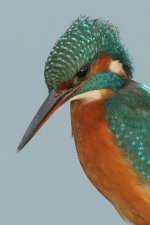nigelblake
don't re member
As I have had quite a few e-mails asking questions re the kingfisher shots in the gallery, links to them below, here is a few notes on how they were taken.
Contrary to what most people might think Kingfishers are relatively easy to photograph. They are birds of habit, also they are territorial, so they will be in the same area most of the time, it just takes a bit of time spent observing a suitable stretch of river to find where they are.
They have favourite perches and will return to them regularly, also they will take to introduced perches quite quickly too, often you hear tales from anglers who have had one sit on their rod, this is the most useful aspect of the birds behaviour from a photographers standpoint.
I set up the hide first, then the following day placed two sticks at an appropriate distance to suit the lenses I planned to use, 600mm and 100-400mm zoom. I also put some groundbait and stones (for weight) in a peanut type mesh bag, this is on a string so I can refill it, and reposition it if necessary, this attracts small fish close to the perches and therefore ensures successful hunting for the Kingfisher, hopefully making it stay for long periods.
I find that most Kingfishers are quite jumpy and will fly off at the slightest movement you make, so it is important to pre-align the camera and not be tempted to move it if the bird does not alight where you want it to. Generally they will dive from one perch and then land on another, so just wait and it will sit where you want it. I also wear dark gloves so that my hand movement is not so visible to them, once you do spook them they can be wary of the hide and take a long time to return. Despite reacting to movements they do not seem to be bothered by (shutter) noise fortunately!
I should add that a hide is essential.
http://www.birdforum.net/pp_gallery/showphoto.php/photo/38078/sort/1/cat/500/page/1
http://www.birdforum.net/pp_gallery/showphoto.php?photo=38316
Contrary to what most people might think Kingfishers are relatively easy to photograph. They are birds of habit, also they are territorial, so they will be in the same area most of the time, it just takes a bit of time spent observing a suitable stretch of river to find where they are.
They have favourite perches and will return to them regularly, also they will take to introduced perches quite quickly too, often you hear tales from anglers who have had one sit on their rod, this is the most useful aspect of the birds behaviour from a photographers standpoint.
I set up the hide first, then the following day placed two sticks at an appropriate distance to suit the lenses I planned to use, 600mm and 100-400mm zoom. I also put some groundbait and stones (for weight) in a peanut type mesh bag, this is on a string so I can refill it, and reposition it if necessary, this attracts small fish close to the perches and therefore ensures successful hunting for the Kingfisher, hopefully making it stay for long periods.
I find that most Kingfishers are quite jumpy and will fly off at the slightest movement you make, so it is important to pre-align the camera and not be tempted to move it if the bird does not alight where you want it to. Generally they will dive from one perch and then land on another, so just wait and it will sit where you want it. I also wear dark gloves so that my hand movement is not so visible to them, once you do spook them they can be wary of the hide and take a long time to return. Despite reacting to movements they do not seem to be bothered by (shutter) noise fortunately!
I should add that a hide is essential.
http://www.birdforum.net/pp_gallery/showphoto.php/photo/38078/sort/1/cat/500/page/1
http://www.birdforum.net/pp_gallery/showphoto.php?photo=38316
Attachments
Last edited:





